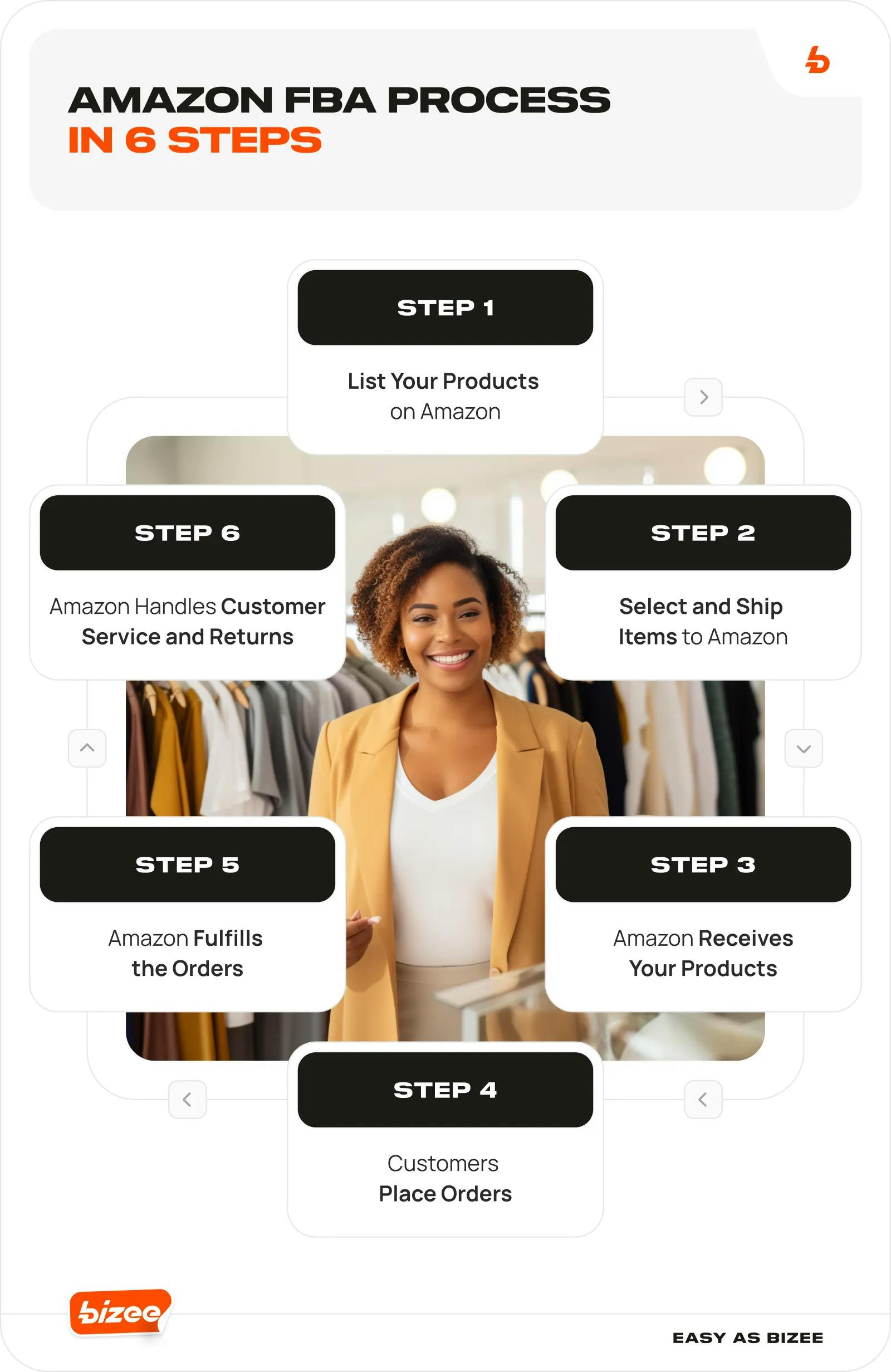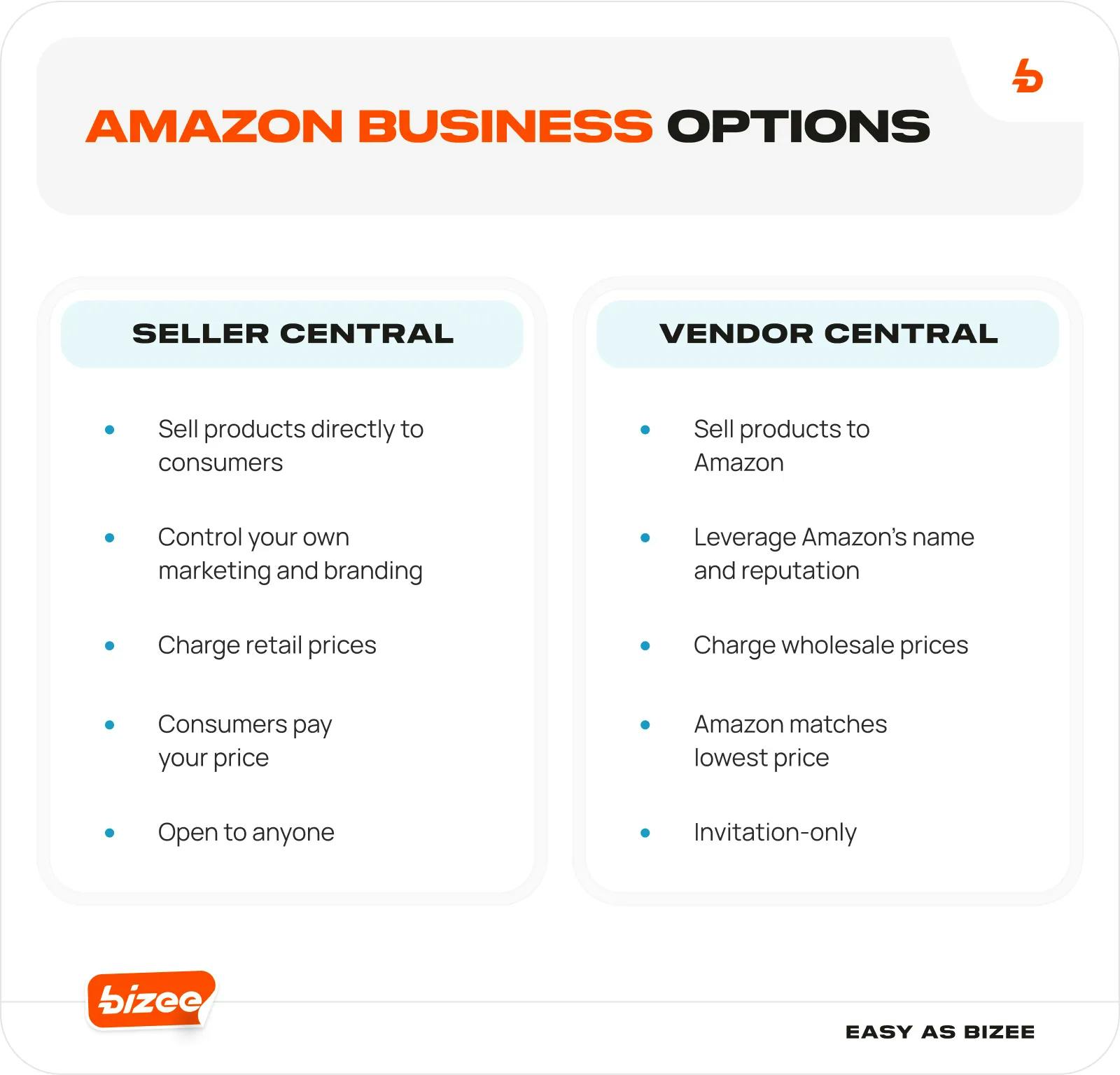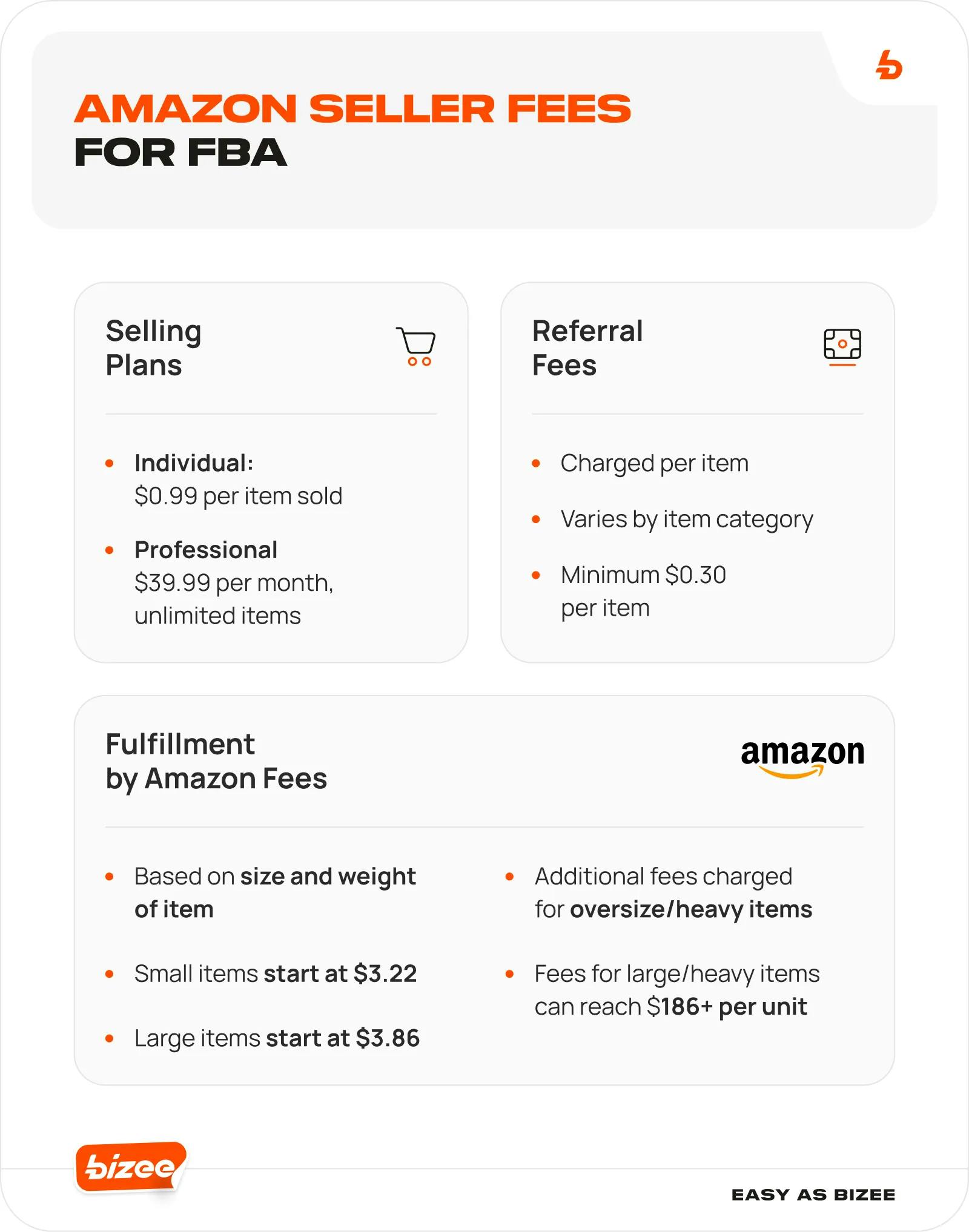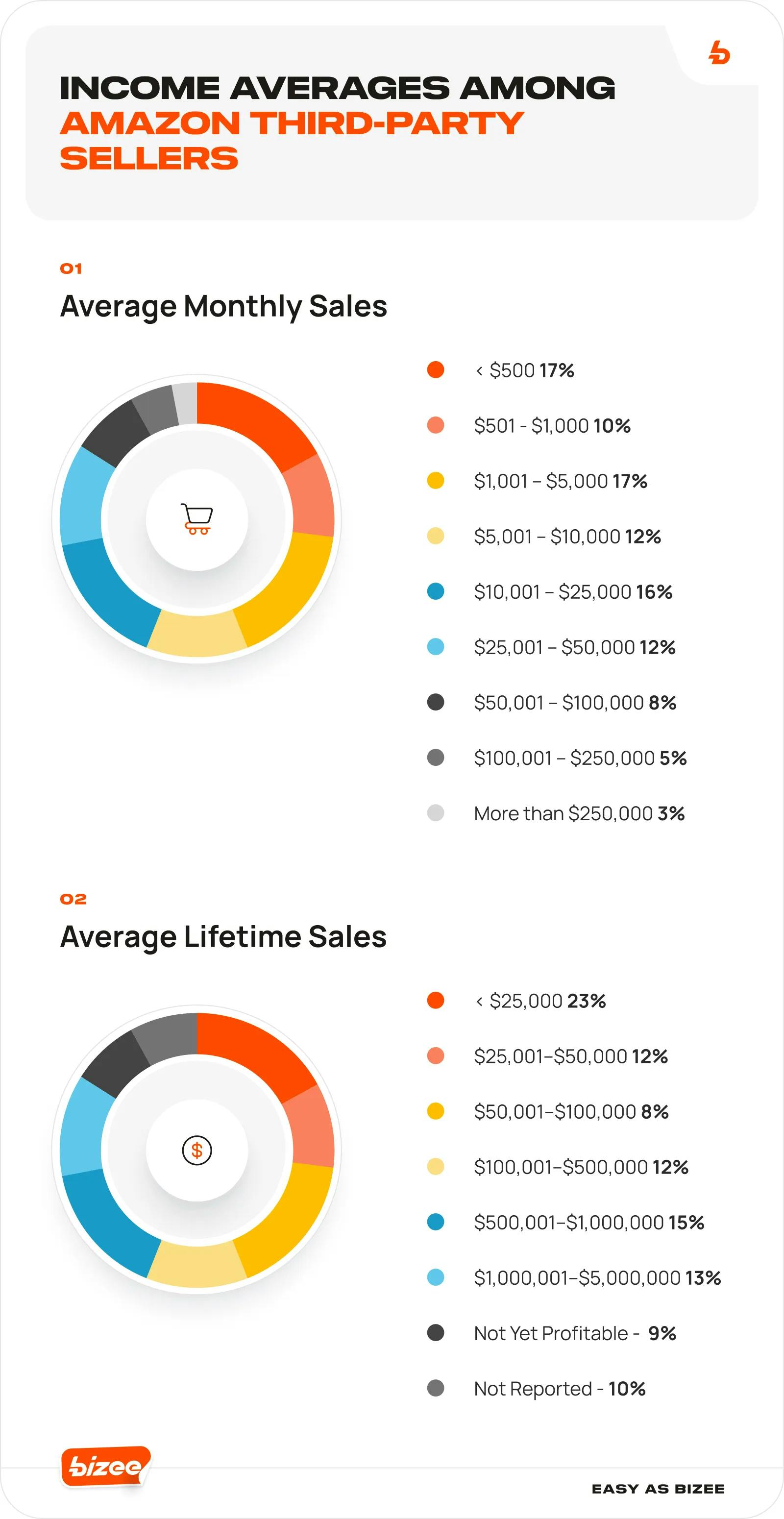Please note: This post contains affiliate links and we may receive a commission if you make a purchase using these links.
TABLE OF CONTENTS
Considering starting an Amazon business with FBA? Fulfillment by Amazon gives third-party sellers more control and more opportunities to run a successful and thriving business. Here, we've got all the details on what it means to be an FBA seller, how much it costs, and everything you need to consider before getting started.
Join the 1M+ businesses that trust Bizee
Get StartedWhat Is Amazon FBA?
Fulfillment by Amazon, or Amazon FBA, is a popular platform for third-party Amazon sellers. When you choose to sell via FBA, you select the items you wish to sell and get them to an Amazon warehouse. From there, Amazon takes over the logistics and manages storage, inventory, shipping, and returns. As a seller, this offers you significant benefits, as it saves a lot of the costs and the headaches of managing retail sales on your own.
According to Amazon, nearly half of all U.S. third-party (3P) sellers opt to use FBA. Globally, that number increases dramatically, with up to 90% of all sellers partnering with FBA. Amazon estimates those using FBA reduce shipping costs by up to 30% and increase sales by 20%-25%.
Even better, Amazon FBA offers a clear path to business ownership for millions of sellers, and it could be a perfect choice for you, too.
How Amazon FBA Works
There are many ways to sell and make money on Amazon. The most common is to set up a 3P shop using FBA, but you do have other options you may want to examine before you decide. Other ways to sell through Amazon include:
- Wholesale: You can become a vendor for Amazon and wholesale products to them, but you'll need to invest more money and wait for an invitation to get started.
- Private Label: This involves creating your own brand and ensuring that the products you sell are totally unique. This requires a larger upfront investment to get your private label brand up and running, so you'll likely want to test the retail waters with other brands before you get started.
- Dropshipping: With dropshipping, you contract directly with manufacturers, and they handle the shipping and logistics.
- Handmade: Amazon Handmade is a direct competitor to Etsy, so if you're selling your own handcrafted products, it can be a great option.
- Retail Arbitrage: This is basically reselling retail items at a markup. If you're a bargain hunter and often find great deals, you can buy up locally sourced products and sell them for a profit on Amazon.
If one of those options sounds more your speed, start researching. But if you want to get started quickly with the support of Amazon behind you — or you just want to test out your retail business plan — you can't beat Fulfillment by Amazon.
To get started, you'll sign up for an Amazon Seller Central account. But before you jump in, it helps to have an understanding of how the Amazon FBA process works.
Step 1: Select and List Items
You'll set up a storefront on Amazon as an FBA seller and create listings for all your products. As an Amazon FBA seller, you'll be eligible to provide products through Amazon Prime and offer free shipping.
Step 2: Ship to Amazon
You can source the products you've listed wherever you wish. You'll be responsible for packaging and prepping the items, then shipping them to an Amazon warehouse. You'll be able to select shipping plans in your Seller Central profile.
Step 3: Receipt by Amazon
Once Amazon receives your items, your listings will go live. Amazon will store your products in their own warehouses. Based on customer demand, Amazon may move inventory to different geographic locations, but you'll always be able to track where your inventory is.
Step 4: Customers Place Orders
Now that your listings are live and your stock is in an Amazon warehouse, customers can begin shopping your products and placing orders.
Step 5: Fulfillment by Amazon
When a customer places an order, Amazon pulls the product, packs it, and ships it according to your settings. This part of the process is totally hands-off for you, freeing you up to focus on other aspects of running your business.
Step 6: Service and Returns
If a customer has a question or concern or they wish to return a product, Amazon will handle that for FBA sellers. This saves a lot of time and means you don't have to be available 24/7 or be responsible for receiving, reshelving, or reimbursing returned items.

How Much Does It Cost to Start With Amazon FBA?
It can cost varying amounts to start an Amazon FBA, but the good news is you're in control of those startup costs, and your business can scale as you grow. We know being responsible with your finances is critical to your success, and you might be wondering, can you start a business with $500? The answer might surprise you.
Corey Ganim is the co-founder of BrandRocket and an Amazon wholesale expert. He says how much you invest at the start is really dependent on your budget and your goals.
"You can start selling on Amazon with as little as $500. If you want to get into some of the higher-level business models such as wholesale or private label, you'll need at least a few thousand dollars to start ($3-$5K for wholesale, $10K+ for private label)."
Initially, this means choosing between becoming an Amazon seller vs. an Amazon vendor.

One important thing to keep in mind: as of the time of this writing, Amazon Vendor Central is invite-only, so it may not be available to you. Most of the time, you're going to start with Seller Central, especially if you plan to become a 3P seller through FBA.
If that's the route you take, your initial startup costs will include your products, which you'll purchase or make before sending to Amazon, and then the fees that Amazon charges FBA sellers.

Keeping your costs low on the front end is crucial to managing your expenses and allowing yourself a larger profit margin. As you grow, your fees may increase, but so will your profit. If you plan to sell more than 40 items a month, you should opt for a Professional selling plan, which allows you to sell unlimited items for a flat fee of $39.99 per month.
Now for the question you've really been wondering:
Is Selling Through FBA Profitable?
Selling through FBA can certainly be profitable if you make smart choices. In fact, 54% of Amazon third-party sellers earn more than $5,000 in monthly sales. In 2023, owning an Amazon FBA business can absolutely earn you a profit, and Ganim says if you're on the fence, now is the perfect time to take the leap.
"There has never been a better time to start selling on Amazon. Over 59% of American households have at least one Amazon Prime subscription as of this writing. There are hundreds of millions of potential customers worldwide eager to buy from third-party sellers like us, making Amazon FBA one of the most profitable e-commerce opportunities of our time."
While competition can be fierce among 3P sellers, statistics show that FBA sellers have the potential to earn more, and there are plenty of pieces of the pie to go around.

Even when looking at lifetime sales, it's not uncommon for an FBA business to earn more than half a million, with 34% surpassing that milestone.
Other Considerations
There are plenty of other things to keep in mind when starting a business as an Amazon seller with FBA. In addition to understanding how it works, how much it costs, and how much you can make, you'll also want to consider these factors:
Play the Long Game
Ganim says running an Amazon FBA business can be profitable, but it's not going to happen overnight. "Commit for the long-term," he says. "This is not a get-rich-quick business." Instead, plan for slow and steady growth, and stay on track by creating a rock-solid business plan to guide you on your journey.
Know What You Can Sell ... And What You Can't
Amazon FBA isn't a free-for-all when it comes to product choice. While you're in control of what you sell, there are certain category restrictions you'll need to keep in mind, including:
- Alcohol (except when licensed and permitted)
- Firearms and weapons
- Prohibited animal products (like fur)
- Invasive plants and seeds
- Drugs and drug paraphernalia
You might find some unexpected items on the list, like certain types of matches and untested children's sleepwear, so it's always best to check with Amazon before selecting your products.
Spread the Word
Part of running a successful FBA business is marketing it and reaching a wider audience of potential customers. Ganim says the more you talk about the business, the better your chances will be of reaching the right people. "Document your journey," he says. "Twitter is a great platform for sharing your struggles/successes while building an audience."
Grow Your Support Network
While you can start as an Amazon FBA seller on your own, you don't want to go through the process without a support system you can go to for resources or to ask questions. "Start interacting with other sellers," Ganim says. "Social media is full of successful Amazon sellers looking to network. Reach out to them and get involved in the community."
Make It Official
You are not required to have a legal business structure in place before starting your Amazon FBA business, but it can go a long way in protecting your assets and giving you the best chance at success. An Amazon seller limited liability company is a popular choice among FBA sellers, and it provides the liability protection you need. Having an LLC can also make it easy to apply for credit and financing, and it makes your business more trustworthy and legitimate.
Is It Still Worth It to Sell on Amazon FBA?
Yes, it is still worth it to sell on Amazon FBA if you follow the steps here and make smart business decisions. One of the first and most beneficial steps you can take is creating a business structure. You can do that with Bizee and take advantage of our $0 + state fee formation. We'll handle all the paperwork — that way, you can focus on starting your new, booming Amazon FBA business.

Wendi Williams
Wendi is a freelance writer based in Indianapolis, IN, with over a decade of experience writing for a variety of industries from healthcare to manufacturing to nonprofit. When she isn't working on solutions for her clients, she can be found spending time with her kids and husband, working in the garden or doing more writing (of the fiction variety).
like what you’re reading?
Get Fresh Monthly Tips to Start & Grow Your LLC



